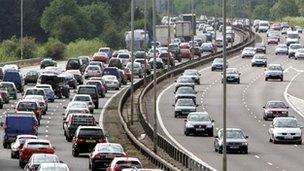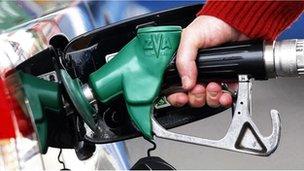Fuel economy tests reveal 'true MPG'
- Published

Realistic fuel economy data is crucial to help drivers chose cars to suit their driving style and budget
Fuel economy figures produced by the government are routinely too optimistic, tests by What Car? magazine have suggested.
More than 60 cars were driven on a variety of roads, ranging from motorways to urban environments, rather than in a laboratory environment.
In every case, the engineers driving the cars failed to achieve the fuel economy claimed by official data.
The government said its tests provided an "indication" of fuel economy.
Extra information
What Car? said its tests provided more realistic fuel economy data.
"The cars were run heavier than they are in the lab," said editor-in-chief Chas Hallett.
Norman Baker, local transport minister, said: "I welcome What Car?'s initiative to provide supplementary information to help consumers estimate fuel economy for their specific driving conditions."
However, he was not prepared to accept that the government overstated the fuel consumption of cars.
"The official test provides an indication of the relative fuel economy of different cars, but is not the whole picture," he said.
Wide gaps
The cars in the latest tests were fitted with equipment that measured carbon dioxide emissions, which was then converted into miles per gallon figures.
The equipment also measured factors such as engine temperature and humidity.
The tests found that some cars delivered fuel economy relatively close to official figures, while others were far removed.

Many drivers find they have to refuel their new cars more often than they had expected
A Jaguar XK Convertible with a five-litre V8 engine does 24.9mpg according to the What Car? tests, compared with an official figure of 25.2mpg, while a Hyundai Santa Fe 4x4 model with a 2.2 litre engine delivers 40.4mpg versus an official figure of 41.5mpg.
Bigger differences were seen with the Mini 1.6D Cooper, the Volkswagen Golf 1.6 TDI 105 Bluemotion and the Peugeot 3008 Hybrid4, which all promise to deliver between 70mpg and 75mpg, while the What Car? test figures ranged from 46mpg to 53mpg.
"This is not a car company-beating exercise," said Mr Hallett. "It is a service for car buyers."
Fuel calculator
Motorists are often frustrated by their inability to match official fuel consumption figures, so the magazine has used the data to create an <link> <caption>online calculator</caption> <url href="http://www.whatcar.com/truempg/my-true-mpg" platform="highweb"/> </link> that will help them work out their true miles per gallon.
"What your car really does to the gallon is top of the agenda of every motorist, or indeed every car buyer," said Mr Hallett.
"With ever-rising fuel prices, this situation is not going to get any better."
In reality, however, much of a car's fuel economy is delivered by its driver.
"Naturally, fuel consumption varies greatly depending on driving conditions, as well as the way the car is driven," said Mr Baker.
"No single test can represent the fuel consumption individual drivers will experience on the road."
The What Car? calculator attempts to factor in different driving styles to help drivers work out how much money they are spending on fuel.
Mr Hallett did not call for official tests to be abolished. The two different methods to measure fuel economy could coexist, he said.
Mr Baker said: "The United Nations Economic Commission for Europe are working on developing an improved official fuel consumption test to better represent average on-the-road fuel economy. The Department has contributed to this work."